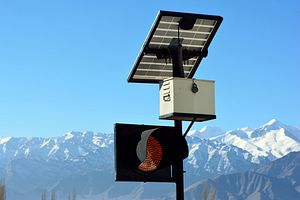When China and the U.S. announced bilateral initiatives to reduce their carbon emissions over the next couple of decades, many commentators immediately turned towards India, questioning whether it would follow China’s lead and announce carbon cuts of its own. Being the world’s third largest emitter of CO2 inevitably draws a lot of attention and with the two highest emitters announcing a deal, India now finds itself under scrutiny, putting the responsibility for a climate deal on its shoulders.
India and China have in the past coordinated their positions prior to climate change conferences, representing an important power bloc. Now that China has announced plans to reduce emissions this could change – diverging paths mean that India may find itself isolated during climate meetings and viewed as the roadblock to achieving a climate deal at COP21 (21st Conference of the Parties of the United Nations Framework Convention on Climate Change) in Paris next year. It is not just China: The developing countries that India and China claim to represent could quickly dismiss any notion of Indian representation if it does not commit to serious and worthwhile emissions reductions. In the eyes of the small nation states and other developing nations, China and India with their high emissions largely transcend the developed/developing dichotomy that often dominates these meetings. The very real effects of increasing temperatures and sea level rise are more of a concern to these small countries than the realpolitik of climate change negotiations.
COP20 is currently taking place in Lima, Peru with December 9-12 earmarked as the days when national statements and high-level meetings will take place. These four days will shed more light on who India seeks to align with and what it plans to announce, with big implications for the success of COP20 and the resulting degree of confidence that nations will have in the run-up to COP21. On Tuesday, the Indian Cabinet approved the stance that the Indian delegation will take during COP20, an official statement noting that the delegation “seeks to protect the interests of the country in climate change negotiations, based on the principles of the United Nations Framework Convention on Climate Change, and it’s [sic] Kyoto Protocol.” This stance is largely unchanged from previous meetings, positioning India as a developing country with the right to emit carbon in its efforts to reduce poverty and improve living standards in a country with an acute development problem, including below average literacy rates and poor healthcare.
Looking at China’s development, it reduced the percentage of its population living in extreme poverty from 84 percent to fewer than 10 percent between 1981 and 2010, representing 680 million people. On a similar measure, extreme poverty in India stands at around 25 percent, while moderate poverty is around 60 percent. China’s growth and development has enabled it to make a commitment to peak emissions by 2030 and increase its share of non-fossil fuels in primary energy consumption to 20 percent by the same year. Growing pollution problems have also led to protests in China, forcing the ruling CCP to take climate action in an attempt to maintain their political mandate. India lags behind China in terms of development, and if it is to solve its complex development issues India will require a long-term plan that takes it beyond 2030. And with poverty, health and education are pressing issues, this makes it immensely difficult to prioritize emissions reductions now. It is also more difficult for the government to justify substantial emissions reductions domestically when increasing coal consumption (PricewaterhouseCoopers estimates that it could double by 2035) drives the economy via electricity generation and energy access.
Indian Prime Minister Narendra Modi has previously expressed concern on climate change. Last month he re-constituted a high-level advisory group on climate change that had not met for over three years, raising hopes that he can develop a progressive plan for India that tackles the wide range of issues that India faces without ignoring the climate problem. As China has shown, there is an economic case for reducing emissions as less pollution improves life expectancy and people’s health, reducing the strain on public services. A healthier population is also vital for a successful and growing economy. Balancing national interest and growing coal consumption with international pressure will be incredibly difficult for India. Still, if the international community takes the time to understand India’s domestic priorities, then helping India reduce its reliance on coal through growing cooperation on renewable energy research and development would make it easier for New Delhi to set out an emissions reduction plan.
On Tuesday, during the meeting of the Ad Hoc Working Group on the Durban Platform for Enhanced Action, the head of the EU delegation was quoted as saying “The EU is of the mind that legally binding mitigation targets are the only way to provide the necessary long-term signal, the necessary confidence to the investors… and provide credibility in the low carbon transition worldwide…” In contrast, the U.S. favors a more open approach in which some countries are allowed to set their own emissions targets, allowing domestic politics to be taken into account. There is some leeway in the shape that a climate deal could take, but it is clear that India now holds the key to reaching a comprehensive climate deal at Paris next year. Despite the obvious difficulties, following the efforts of the U.S. and China in announcing plans to reduce emissions would represent a positive step and show leadership, easing the path towards a climate deal.
If India does not announce plans that the rest of the world would consider to be worthwhile, then the possibility of a global deal will quickly collapse. This would position India as a roadblock and could severely harm its international standing, a reputation that India will be keen to avoid.
Stephen Junor writes on the rise of BRICS and geopolitics.
































